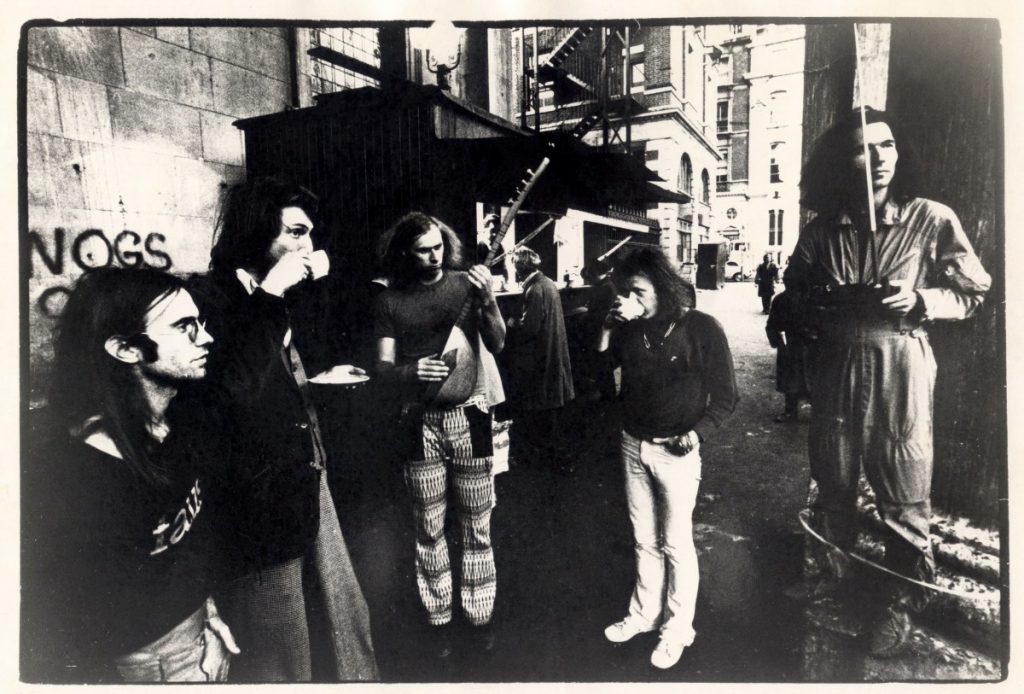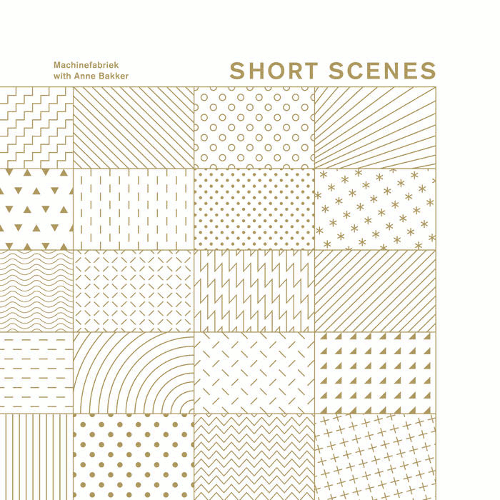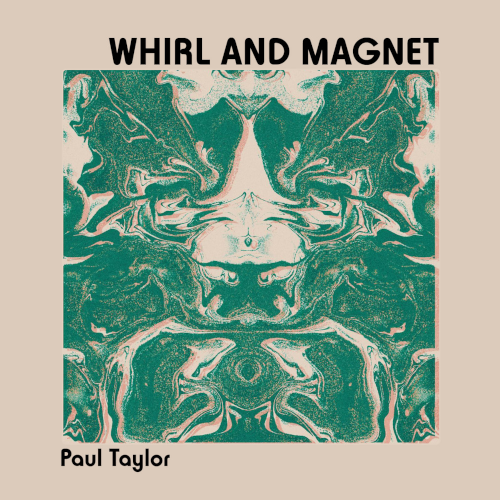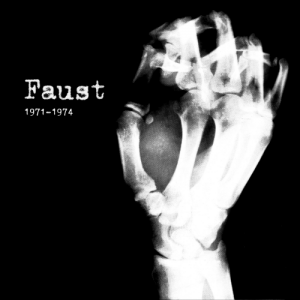 Here we are then, a big ole’ retrospective of Faust‘s… if not golden era, then certainly their best-known stuff. “Canonical” krautrock. And of course krautrock is a silly term at its silliest in reference to Faust — the German band featuring least Germans, singing in French and English and German (and latterly Polish, etc) who got their record deal from renowned British space-cunt Richard Branson.
Here we are then, a big ole’ retrospective of Faust‘s… if not golden era, then certainly their best-known stuff. “Canonical” krautrock. And of course krautrock is a silly term at its silliest in reference to Faust — the German band featuring least Germans, singing in French and English and German (and latterly Polish, etc) who got their record deal from renowned British space-cunt Richard Branson.
What’s significant here though is seeing the band that were practising and seemingly had the wind knocked out of their sails — the band dropped by the aforementioned space-cunt and the subsequent period of obscurity. Much of that period after Faust IV is still somewhat in the dark, but I’d say what this set is showing is that there was still a lot of gas in the band’s tank. So it’s nice that some of that… tank gas can see the light of day now. Yes, that’s absolutely a reasonable metaphor.
I should say that there’s copious sleeve notes, all very sensible and decorous of design, but not lacking in the insouciant tone that particularly bring Jean-Hérve Péron to mind, but clearly saturates the whole band. A band which are on the one hand very serious about what they do, but also massively averse to the sort of self-importance that marked the punk / prog separation.Faust
The one with the x-ray. The fist. Faust / Fist, you see? The LP re-issue in the box set doesn’t reproduce the x-ray sleeve, sadly, though it’s on the cover of the box itself, but it is a lovely thing nevertheless. I’ve never had this on LP and it runs well on LP. The music? I’m going to be honest, this has always been my least favourite of the early records — it’s great, but there’s a bit much that makes me think of trad prog.
There is of course the grating noises, the pan-fidelity voices, the sampled rain sounds, the hotchpotch collaging — but I guess the collage elements strike me as a band finding their voice in exploring loads of voices. Consistent with the later stuff, of course. Just not top of my picks. I feel like a dick because of course much of this studio-as-instrument experimentalism was entirely exceptional at the time. But I guess a dick I shall remain.So Far
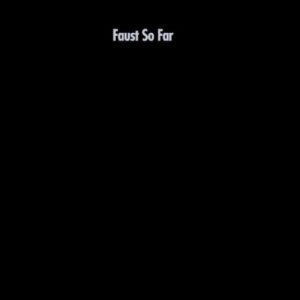 Setting out their store with the evergreen “It’s A Rainy Day Sunshine Girl” — which has appeared in every set I’ve seen of theirs [meaning FaUSt rather than the other Faust] in the last couple of decades. It’s an album that struck me as somehow more “about” Faust, though defining what Faust are about is pretty tricky.
Setting out their store with the evergreen “It’s A Rainy Day Sunshine Girl” — which has appeared in every set I’ve seen of theirs [meaning FaUSt rather than the other Faust] in the last couple of decades. It’s an album that struck me as somehow more “about” Faust, though defining what Faust are about is pretty tricky.
The Faust Tapes
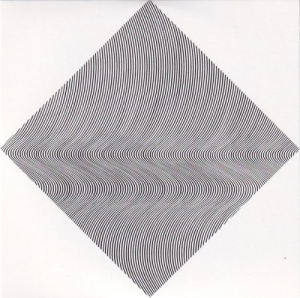 Speaking of all the ideas they can throw at an LP… There’s a point I made years ago reviewing a Throbbing Gristle reissue that what I enjoyed about them is that they treated an album more like a collection of ideas — more photo album than a unitary exposition of concepts. Faust did that here, and did it better — not least because Faust have consistently exposed their actual musicianship and affection for traditional forms.
Speaking of all the ideas they can throw at an LP… There’s a point I made years ago reviewing a Throbbing Gristle reissue that what I enjoyed about them is that they treated an album more like a collection of ideas — more photo album than a unitary exposition of concepts. Faust did that here, and did it better — not least because Faust have consistently exposed their actual musicianship and affection for traditional forms.
IV
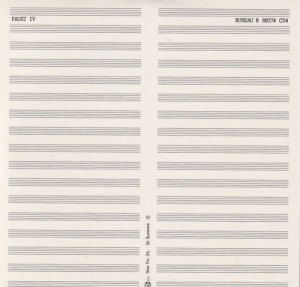 Right in my veins. That opener, “Krautrock”, another evergreen that’s still in their sets with the ridiculous wait for Zappi Diermaier‘s drums. The better recording of “Giggy Smile” (which appears nascently on So Far). The lol hilares screech in the chorus of “It’s A Bit Of A Pain”. The bone fide gorgeous “Jennifer”. Such a record.
Right in my veins. That opener, “Krautrock”, another evergreen that’s still in their sets with the ridiculous wait for Zappi Diermaier‘s drums. The better recording of “Giggy Smile” (which appears nascently on So Far). The lol hilares screech in the chorus of “It’s A Bit Of A Pain”. The bone fide gorgeous “Jennifer”. Such a record.
Punkt
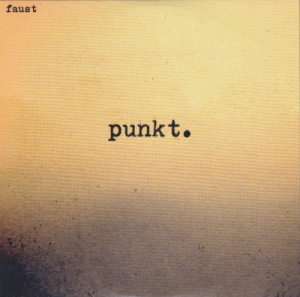 And so we arrive at the stuff we’re not familiar with. Opener “Morning” has appeared before, in partial form, but here we get its full groove.
And so we arrive at the stuff we’re not familiar with. Opener “Morning” has appeared before, in partial form, but here we get its full groove.
The mirror to that absolute stomper of an opener is the closer “Prends Ton Temps”. Very much the Faust I recognise from the live shows. A rhythm that hits that one, but sticks a rest in. Suspense and dynamism. And the Keith Rowe-esque buzzing guitar, and the livid wasp’s nest noise circles around the piece. Never quite resolving the tension. Prends ton temps indeed.
In the middle? Well a filling of delight. Something like The Monks meet Giorgio Moroder (but longer, and weirder) with “Knochtentanz” (actually very much like when Teeth Of The Sea went majority electronic instruments); something of a lovely rock arrangement around a delicate piano piece in “Schoen Rund”; something like a melted acidic Tangerine Dream in “Fernlicht”.Absolutely worth the admission price and genuinely a tragedy to not have it in their canon until now.
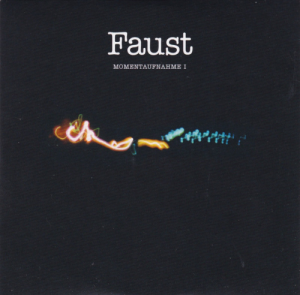 You know when you make a mould of something you’ve got the positive and the negative side? Like one side is the mirror of the other except it’s kind of fucked-up looking? That’s what opener “Flasflas” is like for post-rock. And the weird, lop-sided inverse is worlds more compelling. Somehow a continuous logic with rock music in general, but also somehow more sordid and mouldy.
You know when you make a mould of something you’ve got the positive and the negative side? Like one side is the mirror of the other except it’s kind of fucked-up looking? That’s what opener “Flasflas” is like for post-rock. And the weird, lop-sided inverse is worlds more compelling. Somehow a continuous logic with rock music in general, but also somehow more sordid and mouldy.
I haven’t done my research properly (because TBH I’m quite happy to listen and speculate), but I suspect there’s more electronic keyboard-based stuff on this record. After however many years, a lot of these ideas are commonplaces; but perhaps the tether of sense Virgin found with what we now think of as “canonical” Faust lay in the hard rhythms’ proximity to danceable rock music.
Sheer speculation of course, but it’s difficult to see quite what separates these unreleaseds from the releaseds. There’s some real vim and drama here — particularly closer “Rueckwaerts Durch Die Drehtuer” — and typically an eye for composing ideas rather than jams. I guess at core, if “Rueckwaerts…” was left off for a reason, it’s probably best that it’s because it’s too long.Anyway, yeah. Banger, top to bottom
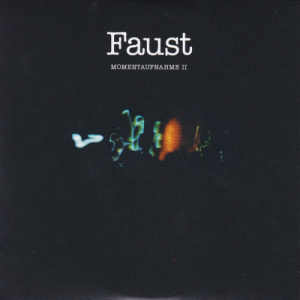 Possibly we’re into the territory of stuff that’s more outrightly obtuse. Though it’s difficult to draw that line to heavily when Faust have been quite so all over the shop. “Gegensprechanlage”, for instance, closes on some fairly spare, solitary electronic bleeping. Like, not supporting or accentuating anything, just the bare sounds. It’s great, but I’m insinuating it’s a bit bold, stark for a band that were meant to be the next Beatles.
Possibly we’re into the territory of stuff that’s more outrightly obtuse. Though it’s difficult to draw that line to heavily when Faust have been quite so all over the shop. “Gegensprechanlage”, for instance, closes on some fairly spare, solitary electronic bleeping. Like, not supporting or accentuating anything, just the bare sounds. It’s great, but I’m insinuating it’s a bit bold, stark for a band that were meant to be the next Beatles.
Again, there’s maybe a sense that these recordings strayed too far from convention — “The Fear of Missing Out” using electronic sounds, initially, to emulate something like Karlheinz Stockhausen twitching his trigger finger from the clock tower. And then somehow seamlessly dissolving into some maudlin guitar chords interlaced with alien bee attacks.
Maybe the thing that’s least obviously present on the records is the centrality of Péron’s theatricality, his showmanship. So it’s heartening that the closing number “As-tu Vu Mon Ombre” is some snuff-muddied vision of the showtune. It is, in a way I don’t think Faust typically are, desperately beautiful. Also included are a couple of 7″s, including their first demo, an early single (“Baby”) and a rejected single. Well into familiar territory and a lot more on the… let’s say label-friendly side of their vast oeuvre. I’m not saying they’re not worth listening to — they’re certainly nice to have, and paint a picture of what the hell Virgin thought they’d do with this wide-open band — but for my money, the meat and bones of this collection is the three LPs of new (to us) material.So yeah. I’m obviously a fan of Faust, but it’s so gratifying that this shadowy material’s been given a proper airing and it’s of a piece, of a standard with the stuff we think of as Faust canon. I can get so fucked off with bands re-releasing studio outtakes and never-fit-for-release cash cows, but this is a record which further confirms that Faust are absolutely rightful in their place in the annals of music legend.
-Kev Nickells-
